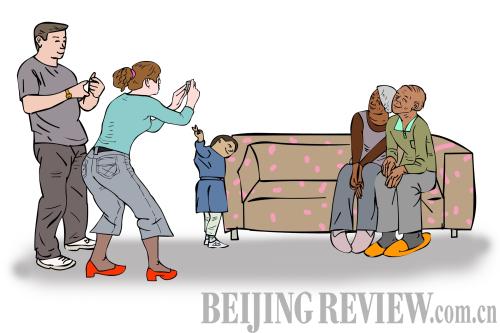|
 |
|
(LI SHIGONG) |
Recently, the All-China Women's Federation and the National Commission on the Aging Problem of China, together with several other departments, jointly issued 24 filial piety standards. At the same time, a filial piety project will be promoted in 15 cities across the country in the following year by providing informational pamphlets free of charge, explaining the standards and spreading the ideals of filial piety.
China has a long tradition of stressing filial piety, and filial piety forms the core of family values. Some people welcome the filial piety standards, holding that it's beneficial to passing on the traditional virtue in modern society. However, some said those standards may not be so easy to implement. For example, one standard requires children "to express love to your parents verbally." This is not easy for the majority of Chinese, who do not have the Western habit of saying "I love you" to people around them, including their parents. The following are excerpts of some opinions:
Updated code of conduct
Fu Dalin (The Beijing Times): The purpose of putting forward the filial piety standards is to promote the traditional Chinese virtue of respecting the elderly.
The filial stories in old times have been passed down from generation to generation, but in the process of modernization, these stories are losing their esteem as the status of filial piety in society is being shaken. In some extreme cases, children refuse to support their elderly parents and even abuse them. These unfortunate elderly people don't feel any filial piety from their children.
Compared with the traditional filial devotion, these new standards are more up to date and relevant to modern society. They emphasize the psychological care for the elderly, for instance. However, in modern society based on the rule by law, inner moral discipline is being replaced by external legal regulation. In this case, filial piety—which depends on people's moral sense and inner discipline—seems unable to prevail in modern society. What we need now is a code of conduct that helps to persuade people to practice filial piety.
These standards do not intend to force people to obey filial principles by law and do not demand that everyone strictly carry out every item. Instead, it offers a guideline for the country's youth to trace back to the roots of China's family-oriented culture and practice filial piety in their own flexible ways.
Yuan Guangkuo (www.xinhuanet.com): The filial piety standards are actually an innovative way of inheriting the essence of filial culture. It's easy to see that many items in the old filial code of conduct are out of date. For example, one story tells of a son lying down on the surface of a frozen river in order to thaw the ice to catch a fish for his stepmother. Today it is necessary to update the code of conduct while leaving the core message of filial piety unchanged.
The most striking highlight of the new standards is its close connection to modern life, which reflects what the elderly people need the most in modern times. For example, it is mentioned that children should teach their parents how to use the Internet or buy suitable insurance for their parents. These two items embody the change and development of society. Besides, the new standards also mention that children should encourage a single parent to get remarried. This is a breakthrough for traditional Chinese thinking, fully demonstrating children's care for their parents' psychological and spiritual health.
Doubts and controversies on the new filial piety standards are to be expected. Actually, as a moral requirement for human beings, filial piety is unlikely to have perfect standards. The standards are not rigid doctrines, but a kind of reminder and suggestion to value the family. The new standards can be seen as an objective. People should strive for the goal, but we needn't force anyone to honor all of the items.
| 